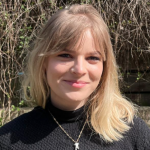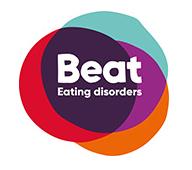Helena discusses collaborative (CASE) PhD studentships and the mutual benefits of working with her non-academic partner, Beat charity.
What are CASE studentships?
Collaborative (CASE) Studentships, formerly known as “Collaborative Awards in Science and Engineering”, are funded PhD studentships in which the student works in partnership with a non-academic institution. This could include organisations in the public, private, or third sector. Examples of partners include charities, hospitals, clinical services, government agencies, technology companies, and even museums. The work of the non-academic partner is typically directly related to the student’s research. Students on CASE studentships work closely with their non-academic partners to conduct mutually beneficial collaborative research projects, as well as to gain additional training and work experience outside of academic environments.
How do CASE studentships work?
Most CASE studentships will have a minimum required amount of time that the student spends on placement with them, for example, three months. The placement can be at any point during the studentship, and that time can be spent however works best for the student and the partner, whether it be a single three month period, a few shorter placements, or spread across the years by working one or two days a week.
What type of work do you do on placement?
My main role can be thought of in two parts. First, I am liaising with Beat to get their thoughts and advice on the promotion and running of the Eating Disorders Genetics Initiative (EDGI). This is a large project exploring how environmental and genetic influences contribute to eating disorder risk, on which Beat are a charity partner. Second, I aim to bring my own thoughts and advice, from an academic perspective, to Beat’s work. Overall, it’s a real mixture, which I think reflects the range of work that Beat does.
In terms of the first part of my role, Beat has advised us on the use of social media (our main recruitment method for EDGI), specifically with regards to the ways in which we can reach the maximum number of people in the most effective way. They have also helped us with difficult decisions as to whether to use trigger warnings (or not). In addition, Beat assisted us with the development of our new social media content, which was aimed at recruiting more people with binge-eating disorder and bulimia nervosa.
For the second part of my role, I’ve been involved in things like helping a Beat colleague with his organisation of the All Party Parliamentary Group (APPG) inquiry into eating disorders research funding. I have also helped review Beat’s website for unconscious bias, tone, and accuracy of information. Most recently, I led on the design and analysis of a survey on the experiences of those with binge-eating disorder, the results of which were used in Beat’s campaign messaging during Eating Disorders Awareness Week.
What have you gained from having a non-academic partner during your PhD?
In short: a lot! It’s been really interesting to see ‘behind the scenes’ of a non-academic organisation. I went straight from an undergraduate degree, to a masters, to a PhD, so I haven’t previously seen the inner workings of any organisation other than a university (and the various bars I worked at before and during my degree!). Despite the fact that EDGI and Beat arguably have the same goal – to improve the lives of those with eating disorders – the type and pace of work is very different. It can be thought of as taking a different route towards the same end.
Things in academia can sometimes move very (very) slowly. At Beat, however, the pace is much faster. For example, I started the work on the binge-eating disorder survey in early January and sent round a summary of the results by mid-February, for use in campaign messaging in early March. In contrast, I’ve been developing a new EDGI survey since September (almost there now!). Regarding the type of work, in academia, with our large databases of anonymised results, you can sometimes feel quite distant from what you’re investigating. Beat, however, works closely with those with lived experience, and offers a range of services that give direct support to sufferers. Both perspectives and working practices are valuable and equally important, and it’s exciting to see what we can learn and achieve when we work closely together.
In a more practical sense, having close links with Beat has definitely come in handy on more than one occasion. For example, I’ve been developing a new survey for inclusion in EDGI, and Beat has kindly allowed me to pilot it with their ambassadors. I also recently wrote an article about the difficulties EDGI are having with recruiting people with binge-eating disorder, and was able to, on rather short notice, get a quote from Beat as to why this might be (thank you Tom and Rebecca!).
What are the benefits to Beat of being involved in a CASE PhD studentship?
The Beat team said: “Having Helena work with us has really helped give us a better understanding of the eating disorder research landscape, and not only how we can partner with researchers but also seek to influence policy makers regarding research and funding. We now also have a better understanding of EDGI and therefore an improved ability to communicate to our supporters about EDGI, which is vital for recruitment. It’s also been great having someone who has a really strong understanding of research being able to support us with some of our own research. The findings from this have improved our understanding of the impact of eating disorders on our beneficiaries and enabled us to better communicate that to the media and our supporters. Helena has also brought a different perspective to our work and this has been invaluable in terms of identifying options that we might not have considered. The CASE studentship has really highlighted what can be achieved when different organisations with the same goal come together. Also, Helena’s just lots of fun to have around!”
Check out LISS DTP website for examples of funded CASE studentships and details of how to apply.



